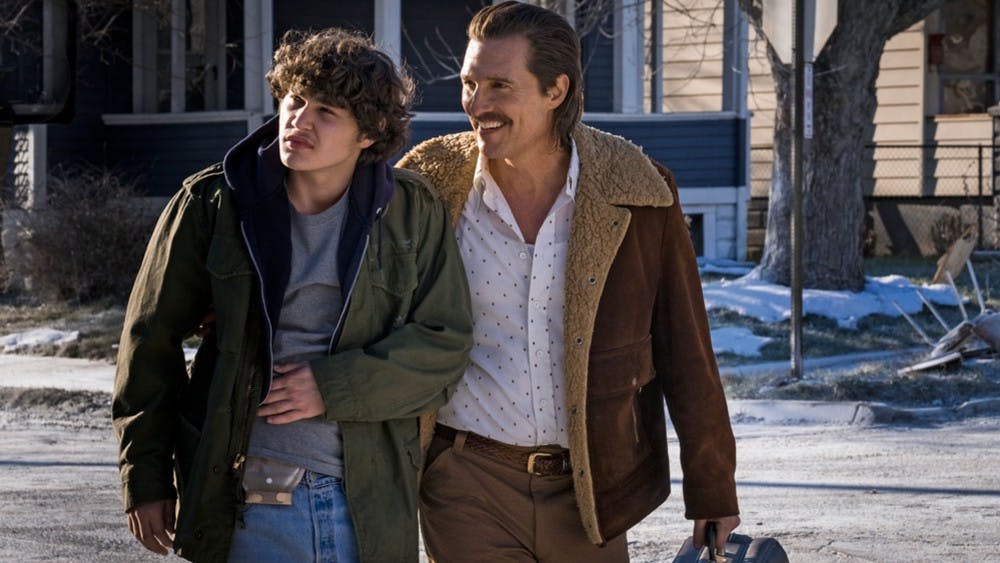In the opening of Martin Scorsese’s 2006 Best Picture winner “The Departed,“ Jack Nicholson’s Frank Costello delivers a magnanimous opening narration.
“I don’t want to be a product of my environment, I want my environment to be a product of me,” Nicholson as Costello said in the film.
This proves ironic as the film shows that people are always influenced by their environment, no matter how much they influence it in turn.
“White Boy Rick,” French-British director Yann Demange’s follow-up to his stellar debut “’71,” takes up this mantle and depicts the humanity of the oft-demonized poor and working-class residents of Detroit, Michigan, in the 1980s.
In a conversation at the film’s beginning, the protagonist, Richard Wershe, Jr., asks his weapons-dealing father why he never moved his family out of Detroit.
Rick Senior, played with charm and sensitivity by Matthew McConaughey, brushes off the query with “Lion don’t leave the Serengeti, son,” a statement so perfectly McConaughey that it is impossible to imagine it being delivered by any other actor.
This question is something that the film circles back around to numerous times, as very few people were as thoroughly influenced by their environment as Richard Wershe, Jr.
What separates White Boy Rick, as he is called by his mostly African-American friends in majority-black Detroit, from the rest is that it was not completely his choice to start dealing drugs.
Rick begins his journey when he takes initiative and decides to sell silenced AK-47s to a local gang led by Johnny Curry, given a wonderfully nuanced portrayal by Jonathan Majors. Curry and his gang welcome Rick with open arms and become his closest friends.
While walking home, Rick is approached by a car containing two FBI agents played by Jennifer Jason Leigh and Rory Cochrane, who have a Detroit narcotics officer, played by Brian Tyree Henry, along for the ride.
These lawmen convince Rick to work for them as an informant and drug dealer, as they manipulate him by threatening to send his father, who has made a life out of selling weapons to nefarious characters, to prison.
Thus begins the saga of White Boy Rick, the informant who turned major drug dealer.
Where most films would have focused on the rise of Richard Wershe, drug kingpin, Demange chose instead to follow the development of Richard Wershe, human being.
Demange peppers his film with little moments of wonderful humanity, following Rick’s relationship with his friends and family, from the heartbreaking depths of his sister’s crack addiction to the comic relief provided by his grandparents living across the street that are played by living legends Bruce Dern and Piper Laurie.
Perhaps most touching of all is Rick’s relationship with his casual girlfriend, Brenda Moore, and their daughter Keisha. The film’s greatest masterstroke comes when Rick Senior shows Rick Junior, still a teenager, how to properly hold his daughter in a scene that will take a place among McConaughey’s greatest hits.
What marks Demange as a truly talented director is his portrayal of the Curry gang, who, in the hands of a less observant and talented director, could have been reduced to grossly racist stereotypes. He portrays them as fully human, if flawed, people who, like Rick, are merely products of their environment.
Rick’s friendship with Rudell “Boo” Curry, played by RJ Cyler , gives the film a necessary tragic undercurrent, as Boo, not a participant in Rick and Johnny’s illegal activities, is made to suffer the most as a result of Rick’s work as an informant.
Avoiding the crime biopic standard depiction of a glamorous lifestyle, “White Boy Rick” drives home the fact that Rick never leaves his ramshackle house in the Detroit projects, and even at his peak in the late ‘80s, he was just trying his hardest to break even.
Rick does not do any of what he does in order to attain wealth or riches. He does it merely to survive and take control of the environment that defines him.
It´s not a perfect film, as not every character is given such a rich, layered interior life as Rick and his immediate family are, particularly those who make up his new gang in the third act.
Piper Laurie’s character of Rick’s grandmother perhaps suffers the most as she is given no reason to exist within the film. She exists as a character who has no interior life, which is particularly glaring given how much empathy other characters are portrayed with.
All in all, “White Boy Rick” is a fine film with more on its mind than just a recounting of events and delivers some of the most real and touching moments viewers will witness on the silver screen this fall.
Do you like this story? The Plainsman doesn't accept money from tuition or student fees, and we don't charge a subscription fee. But you can donate to support The Plainsman.





